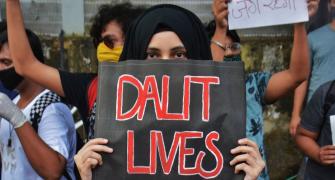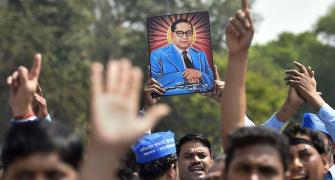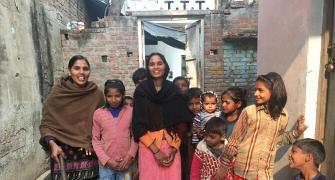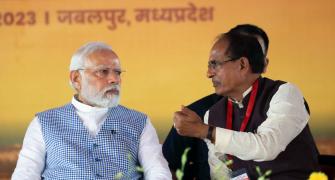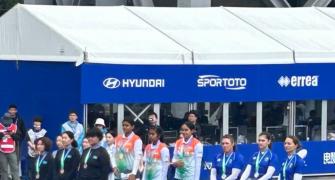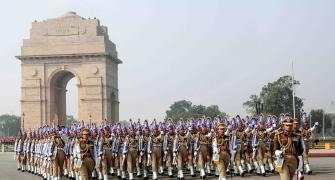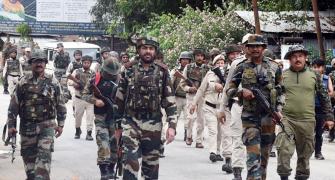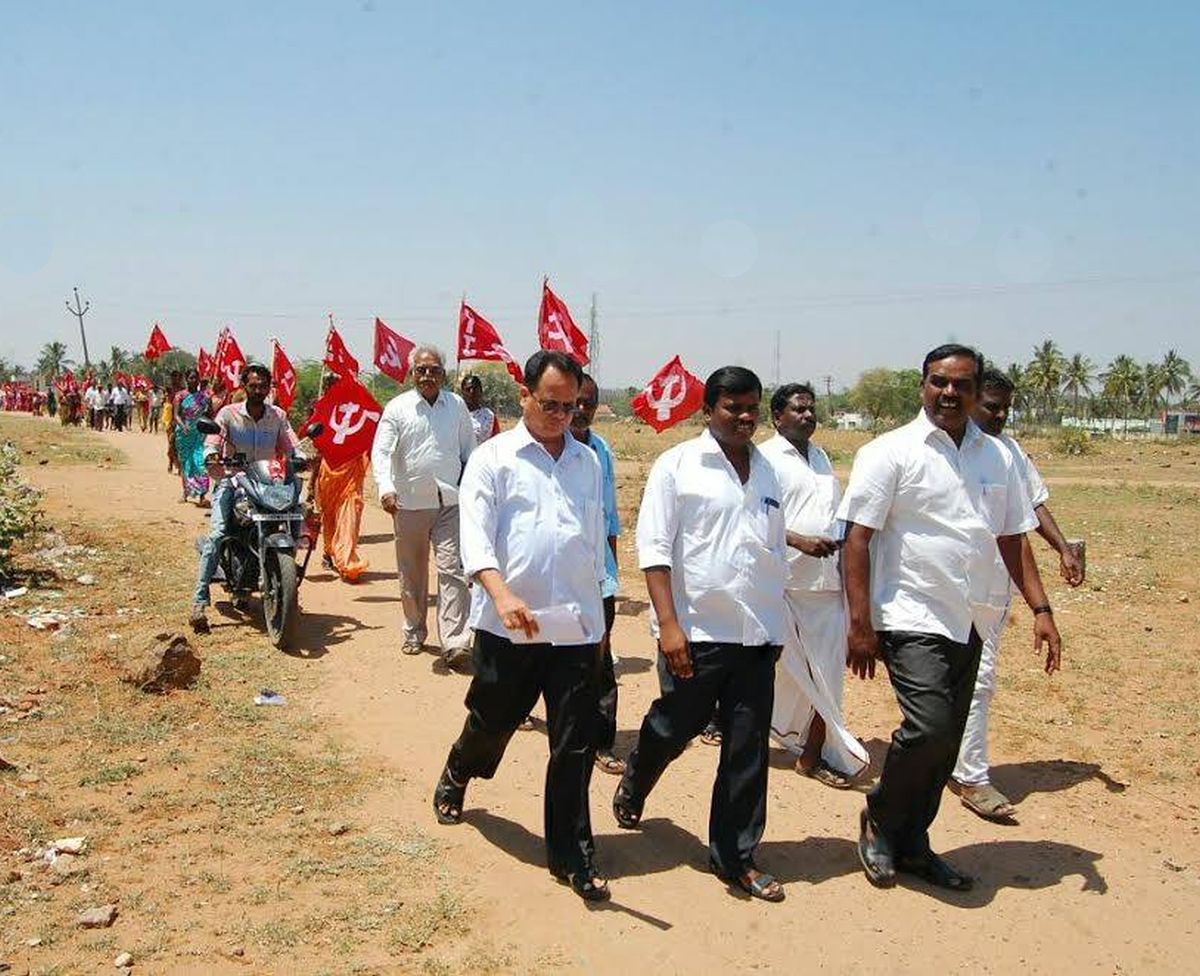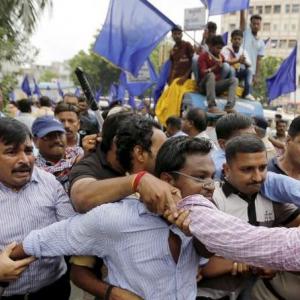'Does anyone understand India?'
'Does anyone have a larger perspective for India as a whole?'
'Today we have rulers who do not understand the ruled.'

This photograph was taken at the swearing in of the newly elected Karnataka government at the Kanteerava stadium in Bengaluru, May 20, 2023. Photograph: ANI Photo
No other economist in India is perhaps more qualified to talk about the direct relation between the Indian economy and caste oppression than Dr M Kunhaman.
His autobiography Ethiru describes how it was to grow up as a Dalit in poverty, how it was to be insulted, humiliated and rejected by society in school, college and later on at work.
The book was awarded the Kerala Sahitya Akademi award last year, but he refused to accept the award.
When he passed out of Calicut University with first rank in economics, he became the second Dalit student to do so after K R Narayanan, who later became India's first Dalit President.
After working as a professor of economics at Kerala University for 27 years, Dr Kunhaman taught economics for a few years at the Tata Institute of Social Sciences.
He is described as a strong voice of the subalterns, a well-known academician, a unique thinker and an economist.
"A neo-Brahminical order has come into existence. This new Brahminical hierarchy is not dominated by Brahmins. So, you have Dalit Brahmins, Adivasi Brahmins, OBC Brahmins, Muslim Brahmins...", Dr Kunhaman tells Rediff.com's Shobha Warrier in the first of a two-part interview:
There was a report in the newspapers recently about Dalits entering a temple in Tamil Nadu for the first time in 100 years.
Last month, there was also a report about a temple in Tamil Nadu getting sealed after Dalits entered the temple.
These incidents happened in the second most literate state in India. Do you think nothing much has changed from the time you grew up in the fifties?
The situation today is no different because while India is a modern economy, it is still a feudal society.
Despite the economic progress and modernisation, despite information technology becoming the driving force of society, we are a society that orders vibhuti online!
Modernisation was used in the West particularly in Europe for removing tradition and feudal practices.
But in India, we use modern technology to modernise tradition; for example things like computer written horoscopeS.
This is revanchism: Bringing back old practices.

That's why at the inauguration of the new Parliament building, we saw the prime minister who is the prime minister of the largest democracy, falling at the feet of priests. This sends out a message.
There are many states in India where Dalits are not permitted to enter the temples and it's not confined to Tamil Nadu alone.
I didn't say it happens in Tamil Nadu alone. What I meant was, it happened in the second most literate state in India...
Yes, when a few Dalits have become mobile, the larger society is annoyed by their upward mobility and their adoption of modern ways of life.
You remember what happened to Rohith Vemula in Hyderabad.
So, whenever individuals or social groups become non-conformists, this kind of altercations happen in society.
What has happened in Tamil Nadu is a continuation of the old prejudices, values and practices.
Do you think these prejudices became more pronounced after right wing politics took centre stage?
See, the core of our Constitution is secularism. But political parties do not practise it. It is votes that are more important to them.
What you have is a repressive democracy. I would go on to say, repressive democracy has replaced representative democracy.
I say this after I see the way in which freedom is violated both in the media and academia by all rulers.
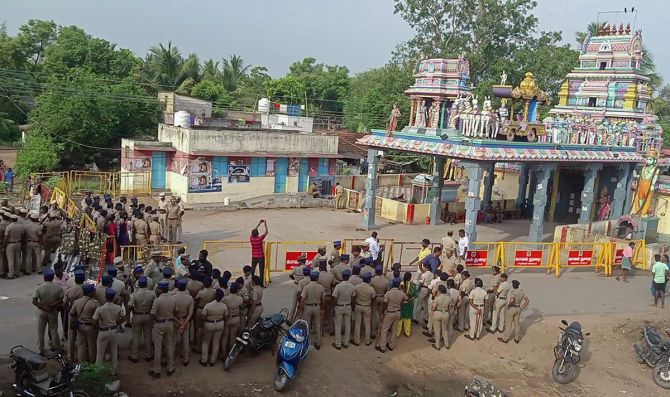
Nehru was a secular leader and wanted India to be a secular country. But subsequent leaders and governments failed in making India a true secular nation.
Who do you think is responsible if India is not a secular country today?
Nehru was not just a politician; he was a statesman and a visionary. And he had a different world view.
If you take development, particularly the development of tribals, he had a vision which was unique.
But his vision was not followed by the politicians who came after him.
You take any leader of today, they don't know what is India. Nehru knew India and he knew only India. He was truly secular, not favouring any caste or religion.
Though I am not a supporter of the Congress party, I feel only Rahul Gandhi and his sister Priyanka can talk in a language that is secular.
Even in the Congress party, only a few individuals have Nehruvian vision.
Many politicians do not know India. Nitish Kumar doesn't know India. Mamata Banerjee doesn't know India. Stalin doesn't know India. They are all local leaders.
Nehru said very clearly, there is no east or west in a world that is round.
We blame Westernisation for all the ills in society, but concepts like democracy, secularism, humanism came from Western society.
Whether you like it or not, this modern thinking emerged there and then came here.
You said today's leaders do not know India. Does that mean we need leaders who understand India as a whole?
Does anyone understand India? Does anyone have a larger perspective for India as a whole?
What's happening is, today we have rulers who do not understand the ruled.
But Nehru understood the ruled. He wrote Discovery of India in 1946 when he was in prison.
 IMAGE: Dr M Kunhaman
IMAGE: Dr M KunhamanToday, we have a ruling party that talks about one religion, one language and one culture.
By talking against eating beef and other non-vegetarian food, are they not allowing Brahminical dominance?
Yes. The Congress was the largest liberal secular democratic party. The party did wonders under the prime ministership of Dr Manmohan Singh.
Some of the crucial economic and social decisions were taken then like the Right to Information, Right to Employment, Right to Education, etc.
But that party did not have the intellectual power to capitalise on what was done by Dr Singh.
The decline of the Congress actually started in the mid 1960s itself. In 1967, it lost power in eight states. The Congress was never able to recapture India.
With this decline, a different ideology was slowly superimposed on Indian society, and Brahminical hierarchy was re-established.

Is this not taking us back by several decades?
It is not just going back, but a reversal of what Nehru had perceived.
The difference now is, a neo-Brahminical order has come into existence.
This new Brahminical hierarchy is not dominated by Brahmins. You can say a caste of neo-Brahmins has emerged.
This hierarchy is dominant in all the fields including the bureaucracy, religion, politics, academia and media. Every field is dominated by a few.
The political parties are no exception; they are organised on the same principles of religion.
What does religion want? Obedience. Discipline. Respect for authorities. Obeisance. Allegiance. All these are feudal values.
And these feudal values are inflicted upon people by religion and political parties. That's why there is no internal democracy in political parties.
Today, you have neo-Brahmins in every group. So, you have Dalit Brahmins, Adivasi Brahmins, OBC Brahmins, Muslim Brahmins...
- Part II of the Interview: 'Caste Won't Disappear From India'
Feature Presentation: Aslam Hunani/Rediff.com

